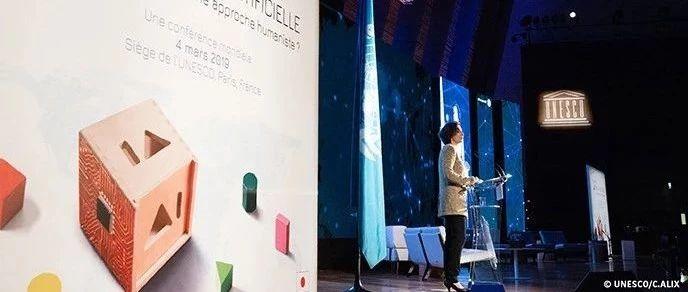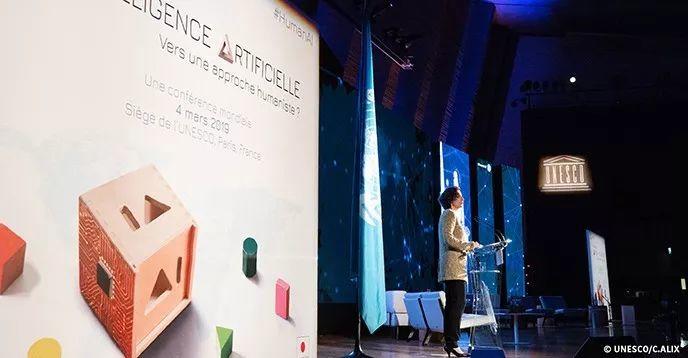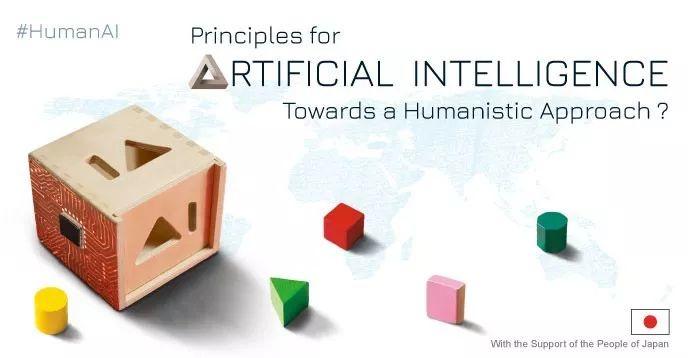
教科文组织人工智能全球会议与会者敦促建立基于人权的人工智能治理
(English version below)

© UNESCO.C.Alix
我们需要确保以以人为本的方式管理人工智能,3月4日在联合国教科文组织总部召开的“人工智能原则:迈向人本之路?”全球会议达成了这一清晰共识。
教科文组织总干事阿祖莱在会议开幕辞中说:“由人工智能所引起的问题并非技术问题,而是关于人类自身的人性,涉及科学、政治、哲学和道德方面的关切。”
阿祖莱强调:“定义相关道德原则的时机已经成熟。这些原则将作为应对本领域挑战的基础和框架,进而确保人工智能将以人文主义价值观为基础,服务于全人类的共同选择。”
在谈到教科文组织关于人工智能的工作时,总干事宣布:“我们现在可以着手为世界科学知识与技术伦理委员会(COMEST)的第一份人工智能报告奠定基础。这一新报告必将为会员国的相关思考和行动提供重要的科学支持。”*
经济合作与发展组织(OECD)秘书长古里亚认为,要确保人工智能成为包容和可持续发展的推动力,合作十分重要。“我们必须做好这一点,因为人工智能正在助推乐观情绪的同时也助长了焦虑、引发了道德担忧。”
古里亚认为经合组织必须与教科文组织合作,共同努力“使人工智能少一些人工、多一些智能”。
在为期一天的会议中,学者、政府间组织代表、政府部长、私营部门、技术界人士、媒体、学界和民间社会纷纷呼吁制定道德原则,以便在清晰透明、责任明确的基础上管理人工智能。他们强调需要尊重隐私的开放数据。他们强调数据的重要性(这里所说的数据远超出传统上由公共服务收集的信息),因为由数据支撑的预测和决策已经使人工智能在疾病治疗、水资源管理和农业规划等方面做出重要贡献。
然而数据并不中立。一些与会者指出,要使技术服务于人性,就必须拥有具备真正代表性和包容性的数据。而这还是一个问题,因为全球一半的人口尚未联网。
菲尔兹奖得主、法国国会议员维拉尼(Cédric Villani)则在会上谈及我们需要在算法面前保持人类主权、在当前人工智能研发竞争面前保持地缘政治主权。在谈到发展人工智能以实现人类目标的挑战时,维拉尼提醒:“如果我们不能妥善应对挑战,那么我们将陷于危险。”
Kuvora公司行政总裁班卓(Bunmi Banjo)警示不要陷入“效率陷阱”而罔顾公平正义,因为我们今天做出的决定将在未来几十年里持续影响人类社会。
但会议发言者同时提请注意,历来以技术创新的现实进度而非预测进度为依据的国际标准制定工具动作迟缓,而在人工智能领域,我们必须以预测进度作为依据。
虽然所有发言者都强调了制定人工智能原则的必要性,但联合国秘书长办公厅战略协调助理秘书长德拉蒙德(Fabrizio Hochschild Drummond)提醒,“目前对不具约束力的国际协定的偏好,以及从合作向竞争的转变,正使得非约束性条约更具吸引力。但我们不能依赖于每个人都做正确的事。……如果我们让市场的无形之手自由运作,我们将获得有用的应用,但我们的隐私将被侵蚀,不平等将会增加,从而加剧社会的两极分化。”
此次会议是教科文组织人工智能系列活动的一部分。在此之前已举办的活动包括关于新技术和人工智能伦理的辩论“技术未来:希望,抑或恐惧?”(2019年1月22日),及非洲人工智能论坛(2018年12月12-13日)。目前,教科文组织正在计划与中国政府合作,在北京举办一场关于人工智能与教育的重大活动(2019年5月16-18日),探讨新兴的人工智能技术和人工智能在教育领域的创新应用。

媒体联系人:
Roni Amelan
教科文组织媒体科
r.amelan@unesco.org
+33 (0) 1 45 68 16 50
* COMEST伦理与人工智能扩展工作组已经完成了关于人工智能伦理的初步研究,该研究建议在该领域建立标准制定工具。该研究将于4月提交给教科文组织执行局,作为与成员国对话的铺垫。对话的目的是推动建立新的标准制定工具。
Participants at Global UNESCO Conference on Artificial Intelligence urge rights-based governance of AI

A clear consensus emerged on the need to ensure a human-centred governance of artificial intelligence (AI) during UNESCO’s Principles for AI: Towards a Humanistic Approach? Global Conference on 4 March at the Organization’s Headquarters.
As she opened the Conference, UNESCO Director-General Audrey Azoulay said, “The issues raised by artificial intelligence are not technological. They concern our own humanity, raising scientific, political, philosophical and ethical questions.”
Ms Azoulay declared that “the time is more than ripe to define the ethical principles that must serve as a foundation and framework of this disruption; to ensure that AI serves collective choices, based on humanist values.”
Referring to UNESCO’s work on AI, the Director-General announced that “We will now be able to work on the basis of a first report of the Commission on the Ethics of Scientific Knowledge and Technology, COMEST. This new report, dedicated to artificial intelligence, will certainly provide major scientific support to Member States’ reflection and initiatives.”*
Angel Gurría, Secretary-General of the Organization for Economic Cooperation and Development (OECD) spoke of the need for cooperation to ensure that AI becomes a driver of inclusive and sustainable growth. “We have to get this right, because while AI is driving optimism, it is also fuelling anxieties and ethical concerns.”
Mr. Gurría spoke of the need to work with UNESCO in a concerted effort to “make AI less artificial and more intelligent.”
Throughout the day, academics, representatives of intergovernmental organizations, government ministers, the private sector, members of the technical community, the media, and civil society called for the development of ethical principles to govern AI on the basis of transparency and accountability. They stressed the need for open data that is respectful of privacy. They stressed the importance of data, which goes beyond information traditionally collected by public services, as it informs the predictions and decisions that already allow AI to contribute to the treatment of diseases, the management of water resources and agricultural planning, for example.
But data is not neutral, and several participants pointed out that making technology serve humanity required data that is truly representative and inclusive, which poses a problem considering that half the world’s population remains unconnected to the internet.
Cédric Villani, winner of the Fields Medal in Mathematics and member of the French parliament, spoke of the need to preserve human sovereignty in the face of algorithms, and geopolitical sovereignty in the face of the present competition to develop AI. Speaking of the challenge of developing AI to serve human goals, Mr. Villani cautioned, “The danger is ourselves, if we fail to rise to the challenge.”
Bunmi Banjo, Managing Director of Kuvora Inc warned against falling into the “efficiency trap” without considering what is just and fair, as decisions taken today will affect humanity for decades to come.
But speakers pointed to the slowness of international standard-setting instruments that have historically followed technological innovation rather than anticipating them, which is what is now required where AI is concerned.
While all speakers highlighted the need to develop principles for AI, Fabrizio Hochschild Drummond, Assistant Secretary-General for Strategic Coordination, Executive office of the Secretary-General of the United Nations, warned, “the current preference for non-binding international agreements, part of the shift from cooperation to competition, is making non-binding treaties much more attractive. But we cannot rely on everyone to be good. […] If we let the invisible hand of the market operate freely, we will get useful applications, but our privacy will be eroded and inequalities will grow, contributing to the polarization of our societies,” he argued.
The conference was part of a series of UNESCO events on AI, following the debate on ethics of new technologies and artificial intelligence, Tech Futures: Hope or Fear? (22 January), and the Forum on Artificial Intelligence in Africa (12 and 13 December 2018). UNESCO is planning a major event on Artificial Intelligence and Education to study emerging AI technologies and innovative practices of the use of AI in education in Beijing, in partnership with the Government of the People’s Republic of China (16-18 May).

Media Contact:
Roni Amelan
Press Service
r.amelan@unesco.org
+33 (0) 1 45 68 16 50
*The COMEST Extended Working Group on Ethics and AI finalized a preliminary study on AI ethics, which recommends a standard-setting instrument in this field. This study will be presented to UNESCO’s Executive Board in April, as an introduction to dialogue with Member States whose purpose is to make progress towards the development of a new standard-setting instrument.
原文始发于微信公众号(联合国教科文组织):教科文组织人工智能全球会议与会者敦促建立基于人权的人工智能治理